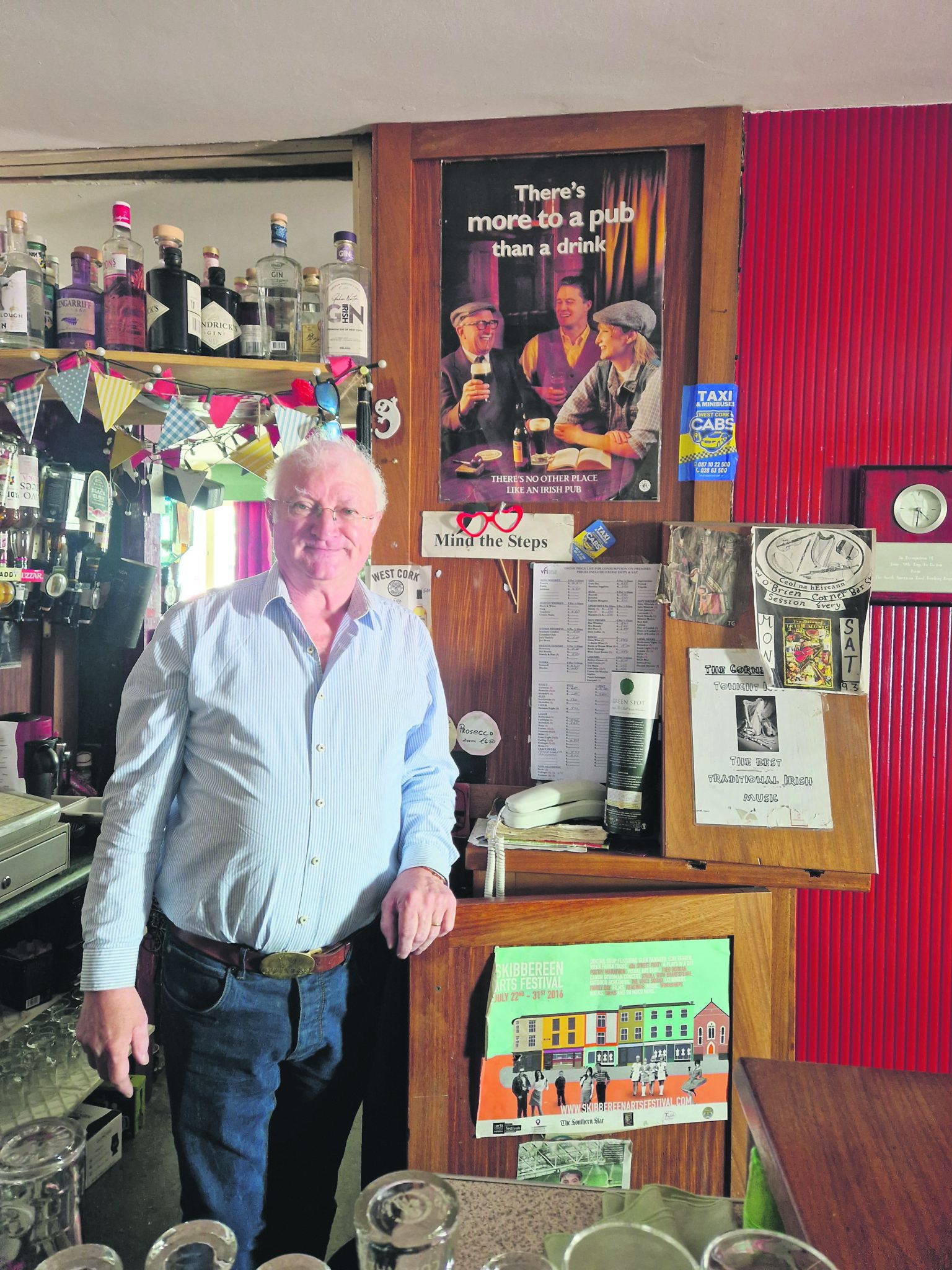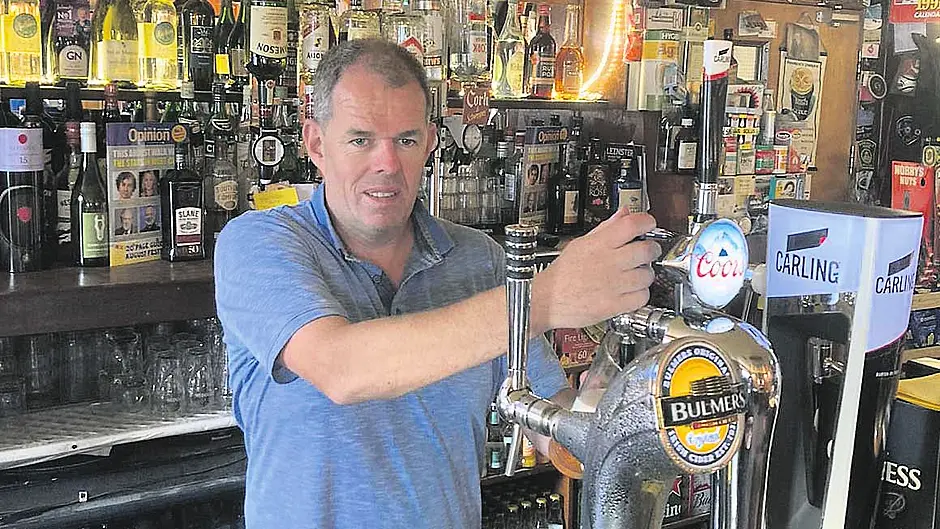The numbers of rural pubs have been in decline for many years. But the pandemic accelerated the demise. Mary McCarthy spoke to some publicans about their roles as hubs of the local community.
THERE’S more indeed to a pub than a drink. William O’Brien, Skibbereen publican at The Corner Bar recalls in a bygone era, there was a small shop with a bar. It was a service and a hobby, where 90% frequented for company and not just for the drink. Conversation was not about work, but rather local news, titbits, and gossip. The people lived simply.
A special occasion like a ploughing match would be the talking point for a month. Social occasions were scarce, but in the old days after a funeral, men always went to the pub. They knew interaction was essential.
‘Back in the 1900s there were about 70 pubs in Skibbereen. A decline was beginning to be evident in the 1960’s with 30-plus pubs and two hotels,’ he said, ‘and these days, there are only five left trading – and two hotels.’
Around 20 years ago, William remembers there was more emphasis on no drink-driving. That was a problem for pubs. If people were not able to get home, pubs suffered. The smoking ban affected business, too. Nowadays, social media’s influence is less conversation, to a pub’s detriment.
‘The memorable nights of pub crawling to 20 pubs are no more,’ he said. ‘Nowadays younger people buy drink at the off licence and drink before they go out. The price of drink is partly to blame.’
Gerard Carey, owner of the Horse and Hound in Skibbereen, started working in McCarthy’s bar in Ilen St at a young age. From the 1980s, he worked in The Fairfield Bar.
He remembers people came to town on mart day. The man went for a pint or two, the woman of the house went shopping and followed her routine of paying bills.
On occasions, some lads would take a Monday off work. This no longer happens, because work is too important. Day drinking is much quieter.
‘The older generations went to the pub many nights of the week, whereas younger people seem to have a different trend,’ said Gerard. ‘After-hours has been replaced by house parties. The pub was a great place to meet a man or woman,’ he said. ‘Drink gave courage and more confidence to make the first approach.
‘More drink, more confidence, more talk. However, these chance meetings in a good atmosphere have been replaced by other ways.’
Covid-19 lockdowns brought new awareness. The pub had been the talking place for those living alone and now part of their routine was missed. For many, the habit was broken.
After the pandemic, emigration also became a trend and that has affected footfall.
‘The next generation does not want to run pubs, because of the long, unsocial hours and costs involved in running them,’ said Gerard. ‘Pubs are closing. This is affecting all areas, especially the rural ones, despite a good living to be made in the business.’
Forty-something Niall O’Mahony runs O’Mahony’s pub in Newcestown and it has been in his family since 1932. He sees it as a dying trade. ‘There are many reasons for this,’ he said, ‘including not being able to predict staff and stock like long ago. It is hard to get staff, and many do not want to work weekends or work long hours. Costs like electricity, vat and Sky are prohibitive.’
However, Niall said, since Covid, drinking at home has become the norm, and lockdown seemed to have been the push some rural pubs got to go out of business.
No drink-driving, the morning-after checkpoints, and below cost selling of alcohol in supermarkets were the among the factors driving change. Ireland has one of the dearest drink prices in Europe.
‘Pubs are one of the top five tourist attractions in Ireland,’ he said. ‘They enjoy food, drink, and the craic. A small help is needed or pubs will not be there.’
‘The life and soul of a community is the pub,’ added Niall, ‘and we must not forget about that. Some parishes have lost their only one.
‘That means there is no meeting point and this effect is being felt by the village. The Covid pandemic showed us the importance of pubs.’
 Will the Irish pub survive? William O’Brien in The Corner Bar, in Skibbereen, believes the price of drink is partly to blame for the slowdown in recent years.
Will the Irish pub survive? William O’Brien in The Corner Bar, in Skibbereen, believes the price of drink is partly to blame for the slowdown in recent years.
A pub on every street
Skibbereen is a perfect example of what is happening in rural Ireland. Today, there are just five pubs and two hotels. This list from the 60s shows how radical the change has been:
Ilen Street
Eugene McCarthy’s
Fintan O’Connell
Deta O’Brien
Tim O’Sullivan
The Bridge
O’Donovan’s
Bridge Street
Jack O’Shea
Katie O’Brien
Pete O’Sullivan
Hannah Connolly (Baby Hannah’s)
John O’Donovan
Michael Hegarty
Denis O’Driscoll
John Prendergast
Mickey Holland
Miss Dillon’s
Wine Vaults
Cahalane’s
Dolly Deacon (The Plough Bar)
Mary O’Hea (Annie May’s)
Main Street
Gerard O’Brien
Chris Noonan (The Cellar Bar)
The Square
Sheehy’s
Market Street
Mc Carthy’s (Pat Joe’s)
North Street
Cullinane’s
Tom Hurley (Mac Cleans)
Mary Hall
Paddy O’Brien
Burn’s
Nagles
Minihan’s
Townsend Street
Donelan’s
The Shamrock Bar
Denis O’Mahony










